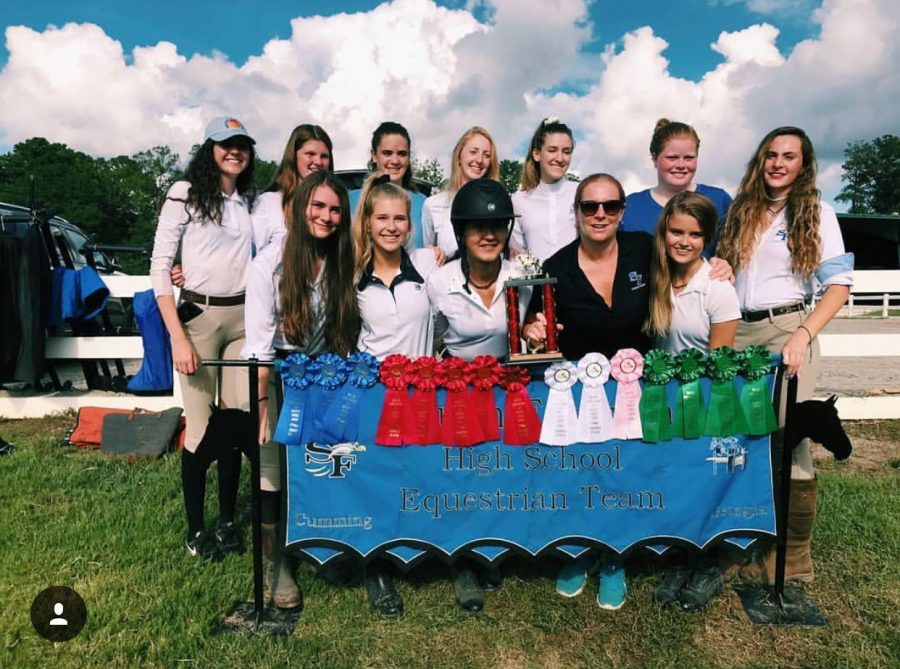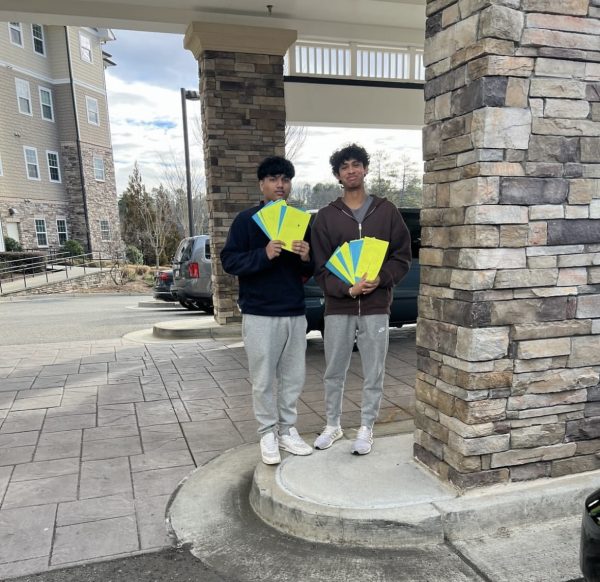Riding strong: South Forsyth Equestrian team
Found on the @SFHS.equestrian Instagram
Second place. Coaches help the lesser experienced riders with what skills they need to practice on up until the competition. On September 30th, the Equestrian team placed Reserve Champion out of 10 teams for their first of five seasons.
November 6, 2018
The surrounding stands are respectfully quiet as the tournament begins. The riders make their way around the course, a calm aura surrounds them as the horses trot steadily and set out to score the first fence. Nearby the judges watch readily to deduce the rider’s performance. Lights flicker over the ring then the sound of a camera lens shutters. Along with this, the only other noises are the soft shuffling of those in the audience and the thumps of horse hooves meeting the turf.
The South Forsyth Equestrian club won their first show of the 2018-19 season last month on September 9th. The team earned first place of the four teams and in their second show of the season they won 2nd place, Reserve Champion, out of 10 teams; their rivals were Milton high school and Fortitude Farm. As of thus far, the equestrian team has 16 members and 3 student coaches for each varsity. Most equestrians that join the school team do have a background for the equestrian sport, though no experience is needed to join the team.
The locations of their competitions change from host to host but usually, they compete at parks such as Wills Park Equestrian Center, Conyers International Horse Park (Olympic Park), or Chicopee Woods Agricultural Center. For each competition, the team has to complete 5 shows. If the team is successful in earning more than 20 points, they’ll move up to regionals, which are usually held in the Conyers Horse Park. After winning first or second place, they will ascend to zones, which change locations each year. This year it is scheduled to be held out of state in Pensacola, Florida. Following the zone competitions, there are the nationals and they’re held further north, such as this year’s nationals in Pennsylvania. If by the end of the 5 shows the team doesn’t have enough points, individual riders from the team can do the same process of regionals, zones, and nationals if they earn 20 points or more.
“Before a competition, we usually do a team dinner, then go home to set up our stuff [equipment] and get to sleep early,” senior Emilee Spicer said.
The riders of the equestrian team will ride at least once a week during the season. Though before a horse show, they ride at least twice a week to work on the points they feel are the weakest. The weaknesses may lie within their position, the strength of their legs, or staying with the horse over a jump. This form of horse riding is known as hunt seat, and it’s where the riders are scored based on their looks rather than speed. For their program, the Interscholastic Equestrian Association, they are scored based off of the trainer who chooses who one be the one to receive the points for the team by each class (also called point rider). Whatever the point rider places, the points of the placing will be added up with the team’s final scores and determine the team placing at the end of the day.
When the Equestrian team places in a show, they always look to see where they can improve with the help of their coaches. Most equestrians have their own horse or lease one, but with the IEA program, they will draw which horse to ride the day of the show at random, giving riders only a few moments to familiarize themselves with the horse. After being given their horse, the equestrians then proceed to do over-fences to figure out how the horse functions by jumping a pair of warm-up jumps. There are different varsities who participate in different classes within a show, ranging from Beginner Flat to 2’6 over fences. Those who do flat classes only see how their horse works during the Schooling horses break.
“A challenge of mine was and still is keeping my legs still,”Alejandra Pena, senior and varsity co-captain, said. “I’ve gotten better about keeping them in place but they usually flopped around and did not look very appealing,”
If the Equestrian team is successful in reaching the nationals, they may receive prize money, lifetime memberships, trophies, or scholarships. Colleges will visit these competitions and give riders the opportunity to talk with their advocators and see the prize list for that year. Typically, it is the highest placing senior riders who will have the most options at hand. Prizes range from $250 to $1100, depending on the Flat class they ride with (Beginner Flat being lowest and Varsity Open Championship being highest).
“Sometimes you can take on teaching lessons or do it as a business […] but I would want to do it as a hobby rather than a career,” senior Emilee Spicer explains.
The Equestrian club is a unique opportunity for those to gain something valuable for having a love for horses and enjoying the outdoors. Those interested in participating in the team are welcome as they accept those who have little to no experience with Hunt Seat or horse riding. Contact their school sponsor, Mrs. Spencer, or meet with the coaches of the Equestrian club to find out where and when to start.










